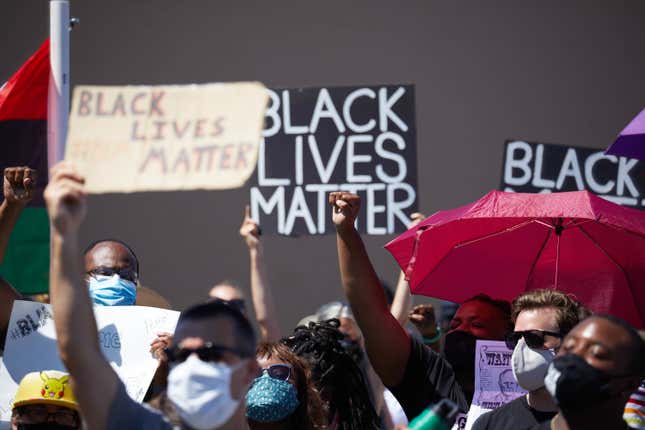
In an effort to fight against the systemic racism that’s embedded in both society and workplaces within the service industry, tens of thousands of workers have planned a massive, full day strike later this month.
On July 20, fast food workers, nursing home employees, gig workers and airport staff will stage the “Strike for Black Lives,” which, according to NBC News will take place in over 25 cities across the country, and those who cannot strike for the entirety of the day will walk out for almost eight minutes, representing the amount of time George Floyd had a former officer’s knee on his neck.
The strike is a massive endeavor that is the result of coordination between multiple labor unions and social justice organizations including Service Employees International Union (SEIU), the International Brotherhood of Teamsters, the American Federation of Teachers, United Farm Workers and the Fight for $15 as well as the social justice groups March On, the Center for Popular Democracy, the National Domestic Workers Alliance and the Movement for Black Lives.
One of the core demands of the strike is for corporations and the U.S government to declare “Black Lives Matter.” They want elected officials in both local and federal governments to pass laws that will increase equity between all races as well as for employers to provide higher wages and allow them to unionize so they can negotiate for better health care benefits, sick leave and support for child care.
From NBC News:
Ash-Lee Woodard Henderson, a strike organizer with the Movement for Black Lives, said corporate giants that have come out in support of the BLM movement amid nationwide protests over police brutality have also profited from racial injustice and inequity.
“They claim to support Black lives, but their business model functions by exploiting Black labor — passing off pennies as ‘living wages’ and pretending to be shocked when COVID-19 sickens those Black people who make up their essential workers,” said Henderson, co-executive director of Tennessee-based Highlander Research and Education Center.
“Corporate power is a threat to racial justice, and the only way to usher in a new economy is by tackling those forces that aren’t fully committed to dismantling racism,” she said in a statement.
Trece Andrews, a worker at a retirement home in the Detroit area that’s managed by Ciena Healthcare, is among those planning to strike.
“I’ve got 20 years in the game and I’m only at $15.81 (per hour),” she told NBC News. Andrews, 49, believes that racial discrimination has been the primary factor for her being continuously passed over for multiple promotions. A single mother to a 13-year-old daughter, she has concerns that a lack of proper protections at her job could result in her contracting COVID-19 and bringing it home to her child.
“We’ve got the coronavirus going on, plus we’ve got this thing with racism going on. They’re tied together, like some type of segregation, like we didn’t have our ancestors and Martin Luther King fighting against these types of things. It’s still alive out here, and it’s time for somebody to be held accountable. It’s time to take action,” Andrews said.
From NBC News:
The strike continues a decades-old labor rights movement tradition. Most notably, organizers have drawn inspiration from the Memphis sanitation workers’ strike over low wages, benefits disparity between Black and white employees, and inhumane working conditions that contributed to the deaths of two Black workers in 1968. At the end of that two-month strike, some 1,300 mostly Black sanitation workers bargained collectively for better wages.
“Strike for Black Lives” organizers say they want to disrupt a multi-generational cycle of poverty perpetuated by anti-union and other policies that make it difficult to bargain collectively for better wages and working conditions.
Systemic poverty affects 140 million people in the U.S, with 62 million people working for less than a living wage, according to the Poor People’s Campaign: A National Call for Moral Revival, a strike partnering organization. An estimated 54 percent of Black workers and 63 percent of Hispanic workers fall into that category, compared to 37 percent of white workers and 40 percent of Asian American workers, the group said.
In addition to walking out, various marches and rallies will take place across the country throughout the day. A group of workers will rally at a McDonalds in Ferguson, Mo., the city where Michael Brown was shot and killed by police in 2014. The workers will then march to a memorial located where Brown was killed. In Minneapolis, where Floyd died in May, nursing home workers will stage a caravan across the city that includes a stop at the airport.
“The reason why, on July 20th, you’re going to see strikes and protests and the walk-offs and socially distanced sit-ins and voter registration outreach is because thousands and thousands of poor, low-wage workers of every race, creed and color understand that racial, economic, health care, immigration, climate and other justice fights are all connected,” the Rev. William Barber II, co-chair of the Poor People’s Campaign, told NBC News.
“If in fact we are going to take on police violence that kills, then certainly we have to take on economic violence that also kills,” he said.